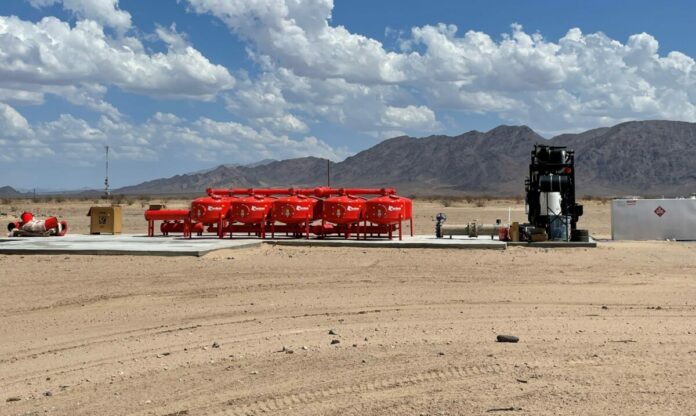It’s been a rough and perplexing six weeks for shareholders of downtown-based water infrastructure development company Cadiz Inc.
Shares have plunged nearly 50% since Labor Day weekend from a trading range of about $13 to a new, lower range of about $7. And while that’s been jolting for investors, it has also been a bit of a mystery.
Cadiz executives had been busy reconfiguring the company’s decades-old plan to transfer water from its Mojave Desert aquifer to water agencies throughout Southern California. They had begun to focus on converting a pipeline the company recently purchased rather than building a new pipeline to connect with the Colorado River Aqueduct.
But the drop in the share price now has the company doing damage control to maintain investor confidence. As the plunge gathered momentum in the days following Labor Day, the company issued a statement saying there were no new developments at the company or with its water transfer plan that could explain the stock movement.
“We don’t know the intricacies of what happened with the stock,” said Cadiz Chief Executive Scott Slater.
Investors spooked
In the last couple weeks, attention has focused on one unnamed major investor who has apparently sold off large blocks of Cadiz shares repeatedly over the course of nearly a month. That, in turn, appears to have spooked other investors who then sold off shares themselves, sending the stock into a downward spiral.
For more insight, the Business Journal was referred to a financial adviser who declined to be identified because, he said, he has advised some Cadiz investors and has a nondisclosure agreement with one of them.
According to this Los Angeles-based adviser, the major investor who has been selling these blocks of shares invested money in Cadiz on behalf of several clients.
Some of this investment manager’s non-Cadiz investment accounts racked up major losses, prompting a series of margin calls. To meet those margin calls, the investment manager apparently started selling blocks of Cadiz shares. In all, according to the financial adviser, it appears the investment manager sold roughly 2 million Cadiz shares over a three-week period in September. (As of June 30, Cadiz had about 41.3 million common shares outstanding.)
Those actions, in turn, triggered other Cadiz investors to sell.
“At some point, all this selling triggered sell algorithms among index funds and other (Cadiz) investors,” the financial adviser said. “And that multiplied the sell effect, and it created a vicious circle.”
The Business Journal could not independently confirm this scenario as neither the investment manager nor their Cadiz investor clients have been identified.
To try to stem the share selloffs, Cadiz put out a statement on Sept. 13 attempting to reassure investors that nothing had changed at the company.
“The company reports that there have been no new material developments nor pending announcements concerning its business operations contributing to market activity,” the statement said. “The company issued its second quarter results on Aug. 13, 2021, and reaffirms its outlook. The company remains confident in its plans to execute on its mission to dedicate its unique and significant land and water assets to the implementation of sustainable water supply, water storage and agricultural projects responsive to California’s resource needs.”
Change in focus
As for that water project, Slater said, the company has been refocusing its efforts on a section of an idle natural gas pipeline it recently purchased from Houston-based Kinder Morgan Inc. That pipeline segment crosses Cadiz’s desert land holdings and heads west through the Apple and Antelope valleys, ending close to the California Aqueduct near Wheeler Ridge south of Bakersfield.
It can be converted to a water conveyance facility more quickly than the company’s long-planned new pipeline can be built to connect its aquifer to the Colorado River Aqueduct, Slater said.
The company is now trying to convince water agencies to sign contracts to convey water through the pipeline. Initially, Slater said, this would likely not involve any water from the Cadiz aquifer; rather, it could help water agencies serving customers in the Mojave Desert to more quickly and cheaply bring water in from other areas.
But first, the company must overcome two legal challenges filed by environmental groups to the use of that pipeline. The lawsuits were filed in March against the Bureau of Land Management, which in the waning days of the Trump administration issued a permit for the conveyance of water through the pipeline.

